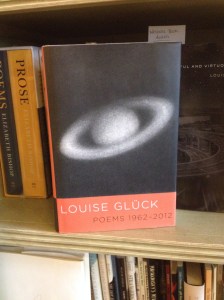Louise Glück, Poems 1962-2012. Farrar, Strauss, and Giroux, 2013. $40.00. Call (504) 524-2940 to order or visit us!
If you have encountered Louise Glück’s work only through the odd anthology, or if you haven’t yet had the chance to discover her, this beautiful volume is the perfect way to delve deep into the canon of one of America’s most important contemporary poets. Robert Boyers writes in The Nation that Glück “has found ways to engage with the world as it is without capitulating to its felt demand that she renounce any alternative sense of what is real.” Glück does not create her own mythology, but rather infuses the stark reality of her lived experience with myth, paradoxically increasing the precision of the realism in these poems. In 1996’s Meadowlands, for example, Glück uses the story of the Odyssey as observed by Penelope and Telemachus to create heightened resonance in poems about her own unraveling marriage. In Penelope’s Song, she writes,
He will be home soon;
it behooves you to be
generous. You have not been completely
perfect either; with your troublesome body
you have done things you shouldn’t
discuss in poems.
Glück inhabits the anger of Penelope, who has been raped in the absence of Odysseus. She calls upon herself to “be generous,” though tragedy and unfaithfulness have driven a wedge between herself and her beloved.
For her there is no shortcut to the truth; truth itself is tangled, unclear, complicated. In “Moonless Night,” Glück writes, “Such a mistake to want / clarity above all things.” Truth is in the bleakness of Vita Nova’s Aubade, the “room with a chair, a window. / A small window, filled with the pattern the light makes.” Yet truth also reveals itself, in a later Aubade from The Seven Ages, through the “Smell of the mock orange tree / Corridors of jasmine and lilies.” Glück confronts the complexity of beauty and sorrow through a careful assortment of objects. The flowers in her poetry, like the chairs, are unadorned.
You may know her most famous poem, The Garden, from 1980’s Descending Figure, which includes the lines:
The garden admires you.
For your sake it smears itself with green pigment,
the ecstatic reds of the roses,
so that you will come to it with your lovers.
Here, as elsewhere, Glück subverts the traditionally “feminine” style of ornamentation. She is anti-Romantic: in the process of ornamentation, her garden “smears” itself. In Glück’s work, nature is no pastoral comfort. It is a set of objects, and like the chair, or the window, it is tinged with the darkness that inhabits all aspects of the human condition. As she writes in Sunrise, from 2009’s A Village Life, “maybe that’s what nothing tastes like, thyme and rosemary.” The natural world is equated with the void that seems always at the edge of these poems. Beauty is not enough for Glück. In her poetry, she seeks something deeper, something harsher. And in this collection, spanning 50 years of her career, we watch as she deftly paints a world of darkness, a world of beauty.

